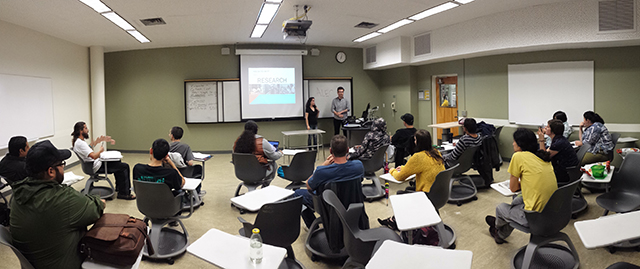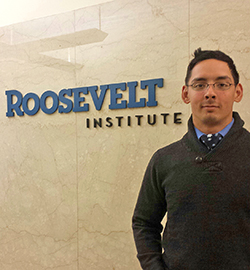
Two years ago, the Kinesiology/Politics double major learned about the Roosevelt Institute, a nationwide organization that “engages young people in a unique form of progressive activism that empowers them as leaders and promotes their ideas for change,” as explained on its website. Lapiz embraced the philosophy, establishing a student chapter at HSU that serves as a think tank for selecting, researching, and addressing social issues.

“Our approach is looking forward and examining changes that can impact the future,” Lapiz said. “We don’t lean left, and we don’t lean right. We go straight ahead.”
That non-partisan, all-inclusive policy has attracted students representing a cross section of disciplines, from Biology to Economics, Kinesiology to Environmental Resources Engineering. Last year, the members put their diverse heads together to formulate two ideas that were selected for RI’s annual “10
Ideas Journal.”
One of the policy proposals—developed by senior chapter member Raul Gardea—detailed a program that would create college savings accounts for kindergarten-age children in Humboldt County. Another group member, Lino Sanchez, created a plan to transform unsightly vacant lots in San Francisco into community gardens.
“I was originally motivated to join the Roosevelt Institute Campus Network because I saw it as the missing link between student activism and outcomes,” Gardea said. “Promoting progressive policy by and for the millennial generation is crucial to shaping the country and world we want to inherit.”
Lapiz’s involvement with the Roosevelt Institute gained momentum soon after he launched HSU’s chapter. He quickly rose through the organization’s ranks, first serving as West Region Policy Coordinator before moving into his current role as West Region Coordinator. That position carries with it the responsibility for guiding members and encouraging growth across the entire 12-state region.
“We present the organization not as a club, but as a network,” Lapiz said. “It’s nationwide, and offers a real opportunity to encourage and influence policy on all levels of government.”
The organization’s name reflects its stated goal of carrying on the legacy of Franklin and Eleanor Roosevelt. Its origins sprang from frustration with the partisan divide during the 2004 midterm election, and the lack of student voice. Reshaping democracy beyond election day through active involvement of young people is the RI’s primary focus.
One national initiative that is gaining momentum is a broad program called “Rethinking Communities.” Humboldt State’s chapter will be actively involved, helping collect data, evaluate and monitor it, with the purpose of evaluating how anchor institutions like HSU impact their surrounding communities.
Addressing that project is consistent with the Roosevelt Institute’s philosophy of looking beyond the immediate, and taking a broad-based approach.
“We want to come up with policies, not for 2014, but for 2040,” Lapiz said. “We look at values like freedom, equality and equity, and examine where we can take our ideas and how to implement them. That might involve the county board of supervisors, the city council, or the university president. We call it “’Build to Impact.’”
As the driving force since it’s outset, Lapiz is invested in the future of HSU’s student chapter and the Roosevelt Institute in general. After finishing college, he’d like to continue his career in public service by furthering his education in public health or continuing to work for the network. Either way, he plans to remain in the west to fulfill his responsibilities to the National Guard.